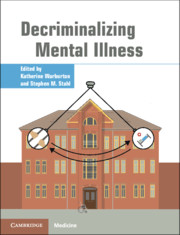Book contents
- Decriminalizing Mental Illness
- Decriminalizing Mental Illness
- Copyright page
- Contents
- Contributors
- Part I Introduction/Description of the Problem
- Part II Solutions
- Chapter 10 Jail Diversion: The Miami Model
- Chapter 11 Jail Diversion: A Practical Primer
- Chapter 12 Principles and Practices of Risk Assessment in Mental Health Jail Diversion Programs
- Chapter 13 Decriminalization in Action: Lessons from the Los Angeles Model
- Chapter 14 Economics of Decriminalizing Mental Illness: When Doing the Right Thing Costs Less
- Chapter 15 Decriminalizing Severe Mental Illness by Reducing Risk of Contact with the Criminal Justice System, Including for Forensic Patients
- Chapter 16 The Cal-DSH Diversion Guidelines
- Chapter 17 Decriminalizing Mental Illness: Specialized Policing Responses
- Part III Psychopharmacological Treatment Considerations
- Part IV Nonpsychopharmacological Treatment Considerations
- Part V Criminal Justice and Social Considerations
- Index
- References
Chapter 15 - Decriminalizing Severe Mental Illness by Reducing Risk of Contact with the Criminal Justice System, Including for Forensic Patients
from Part II - Solutions
Published online by Cambridge University Press: 19 October 2021
- Decriminalizing Mental Illness
- Decriminalizing Mental Illness
- Copyright page
- Contents
- Contributors
- Part I Introduction/Description of the Problem
- Part II Solutions
- Chapter 10 Jail Diversion: The Miami Model
- Chapter 11 Jail Diversion: A Practical Primer
- Chapter 12 Principles and Practices of Risk Assessment in Mental Health Jail Diversion Programs
- Chapter 13 Decriminalization in Action: Lessons from the Los Angeles Model
- Chapter 14 Economics of Decriminalizing Mental Illness: When Doing the Right Thing Costs Less
- Chapter 15 Decriminalizing Severe Mental Illness by Reducing Risk of Contact with the Criminal Justice System, Including for Forensic Patients
- Chapter 16 The Cal-DSH Diversion Guidelines
- Chapter 17 Decriminalizing Mental Illness: Specialized Policing Responses
- Part III Psychopharmacological Treatment Considerations
- Part IV Nonpsychopharmacological Treatment Considerations
- Part V Criminal Justice and Social Considerations
- Index
- References
Summary
Amongst those with mental illness and a history of contact with the criminal justice system (CJS), “forensic patients,” constitute a small but significant subgroup. They typically have severe mental illnesses and have been charged with serious violent offences. As a group, they characteristically have complex mental health and other needs, and concern about their risk of reoffending is a key consideration for those tasked with oversight of their treatment and detention. As a result, forensic patients often spend long periods in secure mental health facilities and are often subject to high levels of supervision once judged to be safe to return to the community.
- Type
- Chapter
- Information
- Decriminalizing Mental Illness , pp. 137 - 154Publisher: Cambridge University PressPrint publication year: 2021

